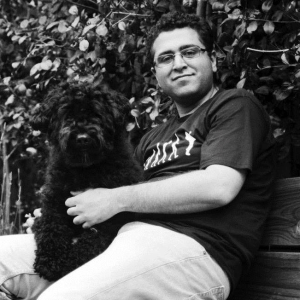
Farhad Farokhi is a Senior Lecturer (Tenured Assistant Professor in North America) at the Department of Electrical and Electronic Engineering at the University of Melbourne. Prior to that, he was a Research Scientist at the Information Security and Privacy Group at CSIRO’s Data61, a Research Fellow at the Department of Electrical and Electronic Engineering at the University of Melbourne, and Postdoctoral Fellow at KTH Royal Institute of Technology. In 2014, he received his PhD degree in Automatic Control from KTH Royal Institute of Technology. During his PhD studies, he was a visiting researcher at the University of California at Berkeley and the University of Illinois at Urbana-Champaign. Farhad has been the recipient of the IEEE Signal Processing Society Best Paper Award, Victorian State Government VESKI Victoria Fellowship as well as the McKenzie Fellow and the 2015 Early Career Researcher Award, 2020 MSE Excellence Award for Early Career Research, 2021 School of EMI Special Recognition Award from the University of Melbourne. He has been part of numerous projects on data privacy and cyber-security funded by the Defence Science and Technology Group, the Department of the Prime Minister and Cabinet, the Department of Environment and Energy, and CSIRO in Australia. His research interests include security and privacy in cyber-physical systems, such as smart grids and intelligent transportation systems.
E-mail: farhad<dot>farokhi<at>unimelb<dot>edu<dot>au
Available position: I am currently looking for multiple PhD students with background in physics (quantum), information theory, control theory, statistics, and optimization. Please note that, in Australia, you will generally need a MSc/MPhil to be admitted into a PhD program. If you are interested, please send me an e-mail with your CV and both BSc/MSc transcripts. I receive a lot of emails and may not respond to you if you do not give me all the required documents (CV and transcripts) or if you do not qualify to apply for PhD (e.g., do not have MSc, your background is not one of the topics that I mentioned earlier). Finally, my research is rather theoretical and requires solid background in mathematics so please only contact me if you find theoretical research interesting or if you have a strong background in mathematics. Otherwise, I would not really have a project that works for you …
Assessing Vulnerability of Quantum Systems Against Arbitrary Unauthorized Listeners
The following is a brief blogpost about my paper that appeared in Physical Review A: https://journals.aps.org/pra/abstract/10.1103/PhysRevA.109.022608 This paper presents a new way to test the vulnerability of quantum computing and communication systems when we do not know the intentions of unauthorized listeners. When using quantum communication or computing systems, classical data must be encoded into…
Design of Real-time Optimisation Methods with Guaranteed Performance: Discovery Project, Australian Research Council (ARC)
The project aim is the development of a framework for the advancement of optimisation algorithms operating in real-time applications. This project expects to generate new knowledge in the area of systems theory and optimisation, and its application to time-varying problems. Expected outcomes of this project should lead to a new theoretical and practical framework that…
On the Privacy of TraceTogether, the Singaporean COVID-19 Contact Tracing Mobile App and Recommendations for Australia
Authors* (in Alphabetic Order): Hassan Asghar (Macquarie University), Farhad Farokhi (The University of Melbourne), Dali Kaafar (Macquarie University), Ben Rubinstein (The University of Melbourne). * The authors thank Vanessa Teague, cryptographer, from Thinking Cybersecurity for fruitful discussions. Introduction The Australian government is exploring the use of contact tracing mobile apps as a tool for public health officials…
Non-stochastic privacy
A common thread or assumption among all provable privacy frameworks, such as information-theoretic privacy and differential privacy, is randomization for safeguarding privacy. The definition of differential privacy assumes the use of randomized functions and information theoretic tools used so far have been based on randomized random variables. However, many popular heuristic-based privacy-preserving methods, such as…
Awards/Honours/Grants
- IEEE Signal Processing Society Paper Awards (2022).
- Safety Verification for Learning Autonomous Systems, Defence Science and Technology Group (DSTG) (2022)
- School of Electrical, Mechanical and Infrastructure (EMI) Engineering Special Recognition Award, The University of Melbourne (2021)
- Safe Learning in Distributed Multi-Agent Control, Defence Science and Technology Group (DSTG) (2021)
- Melbourne School of Engineering (MSE) Excellence Award for Early Career Research, The University of Melbourne (2020)
- Design of Real-time Optimisation Methods with Guaranteed Performance, Australian Research Council (2020)
- Senior Member, IEEE (2019)
- Platforms for Open Data (PfOD), Department of the Prime Minister and Cabinet (2018, 2019)
- National Energy Analytics Research (NEAR), Department of the Environment and Energy (2018, 2019)
- Data Driven Cities & Energy Challenge, CSIRO (2018)
- DPAIP, Data Privacy in AI Platforms: Risks Quantification and Defence Apparatus, Next Generation Technologies Fund, Defence Science and Technology Group (DSTG) (2018)
- VESKI Victoria Fellowship, Victorian State Government (2017)
- Tactical Security and Health in Multi-Modal Sensor Control and Management, Defence Science and Technology Group (DSTG) (2016)
- McKenzie Fellowship, The University of Melbourne (2016)
- Early Career Researcher Grant, The University of Melbourne (2016)
- Outstanding reviewer, IEEE Transactions on Control of Network Systems (2015)
- IEEE Control System Society Outreach Fund (2015)
- Finalist in the European Embedded Control Institute (EECI) PhD Award (1 of 4 PhD graduates from Europe in the field of Control for Complex and Heterogeneous Systems) (2014)
- Wallenberg Foundation Postdoctoral Scholarship at Stanford University (declined/prior commitment) (2014)
- Travel grant by Sten och Lisa Velanders Forskningsfond to attend IEEE CDC (2013)
- Best presentation in session at American Control Conference (ACC) (2012)
- Travel grant to attend EECI-HYCON2 Graduate School on Control (2011)